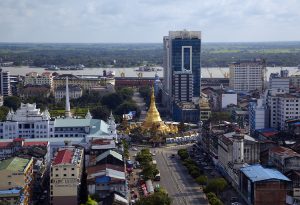Myanmar Sanctions: A Critical Analysis Of UK And Australian Policies

Table of Contents
UK Sanctions on Myanmar
Scope and Target of UK Sanctions
The UK has implemented a range of sanctions against Myanmar, targeting key individuals and entities within the military junta responsible for the coup and subsequent human rights abuses. These sanctions primarily consist of:
- Financial sanctions: Freezing assets held in the UK by designated individuals and entities.
- Travel bans: Prohibiting sanctioned individuals from entering the UK.
- Arms embargo: Restricting the sale and supply of arms and related equipment to Myanmar.
Examples of sanctioned individuals include Min Aung Hlaing, the leader of the military junta, and several other senior military officials. Entities such as Myanmar Economic Corporation (MEC) and Myanma Oil and Gas Enterprise (MOGE) have also been targeted. As of October 2023, the UK has sanctioned over 100 individuals and entities. The legal framework for these sanctions is underpinned by the Sanctions and Anti-Money Laundering Act 2018, allowing for swift and targeted action.
Effectiveness of UK Sanctions
Assessing the effectiveness of UK sanctions on Myanmar is complex. While it's difficult to definitively quantify their impact, some argue they have:
- Limited the junta's access to international finance: Freezing assets makes it harder for the regime to fund its operations.
- Increased international pressure: Sanctions contribute to a broader international condemnation of the regime's actions.
However, limitations exist:
- Sanctions evasion: The junta may find ways to circumvent sanctions through alternative financial channels.
- Limited impact on the military's internal economy: The military's economic activities are largely self-sufficient, reducing the impact of external sanctions.
- Humanitarian consequences: Sanctions can have unintended negative consequences on the civilian population, particularly regarding access to essential goods and services.
The effectiveness of UK sanctions remains a subject of ongoing debate, requiring further research and analysis. Reports from organizations like Amnesty International and Human Rights Watch offer valuable insights into the impact and limitations of these measures.
UK's Cooperation with International Partners
The UK has actively collaborated with other nations and international organizations, such as the EU and UN, in coordinating sanctions against Myanmar. This coordinated approach aims to maximize pressure on the junta and minimize the potential for sanctions evasion. The UK's engagement with international partners is crucial for the success of its sanctions regime.
Australian Sanctions on Myanmar
Scope and Target of Australian Sanctions
Australia's sanctions against Myanmar are largely aligned with those of the UK, encompassing similar measures: asset freezes, travel bans, and an arms embargo. However, there may be subtle differences in the specific individuals and entities targeted. For instance, while both countries have sanctioned Min Aung Hlaing, the specific list of sanctioned entities might differ slightly, reflecting each country's assessment of key actors within the Myanmar military regime. As of October 2023, Australia has also sanctioned over 100 individuals and entities. The legal basis for Australian sanctions is primarily the Autonomous Sanctions Act 2011.
Effectiveness of Australian Sanctions
Similar to the UK's experience, assessing the effectiveness of Australian sanctions presents challenges. While they contribute to the international pressure on the Myanmar junta, the extent of their economic impact is debatable. Positive aspects include signaling international condemnation and potentially limiting access to certain resources. Negative impacts may include unintended consequences for the civilian population and the possibility of sanctions evasion. Direct comparisons with the effectiveness of UK sanctions require further in-depth analysis of specific economic indicators and behavioral changes within Myanmar.
Australia's Cooperation with International Partners
Australia, like the UK, actively participates in international cooperation on Myanmar sanctions, collaborating with partners such as the US, EU, and other like-minded nations. The level of coordination and the specific partnerships may differ, however, reflecting the different diplomatic strategies and priorities of both countries.
Comparative Analysis of UK and Australian Policies
Similarities and Differences
| Feature | UK | Australia |
|---|---|---|
| Sanctions Types | Asset freezes, travel bans, arms embargo | Asset freezes, travel bans, arms embargo |
| Target Groups | Military leaders, businesses linked to junta | Military leaders, businesses linked to junta |
| Legal Framework | Sanctions and Anti-Money Laundering Act 2018 | Autonomous Sanctions Act 2011 |
| International Cooperation | High, with EU and UN | High, with US, EU, and other partners |
The primary similarity lies in the types of sanctions employed and the general targets. Differences may lie in the specific individuals and entities sanctioned, reflecting individual assessments and intelligence gathering. The legal frameworks, while achieving similar aims, differ in their specific mechanisms and legal language.
Effectiveness and Challenges
Both the UK and Australia face common challenges in enforcing their sanctions regimes, including the potential for evasion through illicit financial flows and the difficulty of accurately assessing the impact on the Myanmar economy. Furthermore, both countries need to balance the need for effective pressure with the potential for unintended humanitarian consequences. Potential solutions include enhanced international cooperation to strengthen enforcement mechanisms and targeted measures to minimize harm to civilians.
Future Directions
Strengthening international coordination and collaboration is crucial. The UK and Australia could benefit from sharing best practices, intelligence, and strategies to improve sanctions effectiveness. They should also explore targeted sanctions to minimize the impact on humanitarian assistance while maintaining pressure on the military regime. Further research is needed to improve understanding of the sanctions' impact and refine approaches to maximize their effectiveness.
Conclusion: Myanmar Sanctions: A Critical Evaluation of UK and Australian Approaches
This analysis reveals that while both the UK and Australia have implemented comprehensive sanctions regimes against Myanmar, assessing their overall effectiveness requires ongoing monitoring and evaluation. The limitations of sanctions, including evasion and unintended consequences, highlight the need for a nuanced approach that considers both the strategic goals and humanitarian implications. The comparative analysis demonstrates the importance of coordinated international action and improved enforcement mechanisms to achieve a more significant impact. Further research on the effectiveness of Myanmar sanctions and international cooperation is crucial. We encourage readers to continue this discussion on Myanmar sanctions and participate in advocating for stronger, more targeted, and coordinated international action to address the ongoing crisis in Myanmar. The future of Myanmar hinges, in part, on the continuous evaluation and improvement of these vital tools.

Featured Posts
-
 The Enduring Legacy Of Dooms Dark Ages Developer Inspiration
May 13, 2025
The Enduring Legacy Of Dooms Dark Ages Developer Inspiration
May 13, 2025 -
 Kostyuk Protest Protiv Uchastiya Rossiyanok V Tennisnykh Turnirakh
May 13, 2025
Kostyuk Protest Protiv Uchastiya Rossiyanok V Tennisnykh Turnirakh
May 13, 2025 -
 Targetiranje Roma Uni A Roma Srbi E Reagu E Na Iz Ave Marinike Tepi
May 13, 2025
Targetiranje Roma Uni A Roma Srbi E Reagu E Na Iz Ave Marinike Tepi
May 13, 2025 -
 Romi V Ukrayini Mistsya Prozhivannya Chiselnist Naselennya Ta Istorichniy Kontekst
May 13, 2025
Romi V Ukrayini Mistsya Prozhivannya Chiselnist Naselennya Ta Istorichniy Kontekst
May 13, 2025 -
 Kak Novye Standarty Po Fizike I Khimii Povliyayut Na Detskie Sady
May 13, 2025
Kak Novye Standarty Po Fizike I Khimii Povliyayut Na Detskie Sady
May 13, 2025
Latest Posts
-
 Elsbeth Sneak Peek Investigating Potential Issues At David Alan Grier Funeral Home
May 13, 2025
Elsbeth Sneak Peek Investigating Potential Issues At David Alan Grier Funeral Home
May 13, 2025 -
 Good Fight Season 2 Episode 18 Preview Elsbeths Fight Against Judge Crawford
May 13, 2025
Good Fight Season 2 Episode 18 Preview Elsbeths Fight Against Judge Crawford
May 13, 2025 -
 David Alan Grier Funeral Home Owner A Closer Look At The Elsbeth Preview
May 13, 2025
David Alan Grier Funeral Home Owner A Closer Look At The Elsbeth Preview
May 13, 2025 -
 Will Elsbeth Prevail Analyzing The Season 2 Episode 18 Preview
May 13, 2025
Will Elsbeth Prevail Analyzing The Season 2 Episode 18 Preview
May 13, 2025 -
 David Alan Grier Funeral Home Elsbeth Sneak Peek Reveals Potential Discrepancies
May 13, 2025
David Alan Grier Funeral Home Elsbeth Sneak Peek Reveals Potential Discrepancies
May 13, 2025
